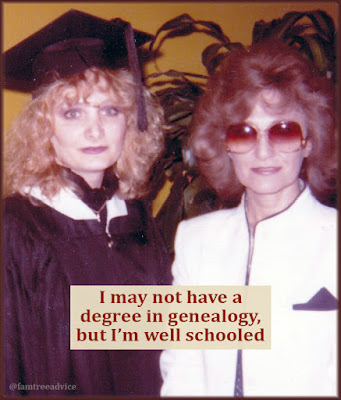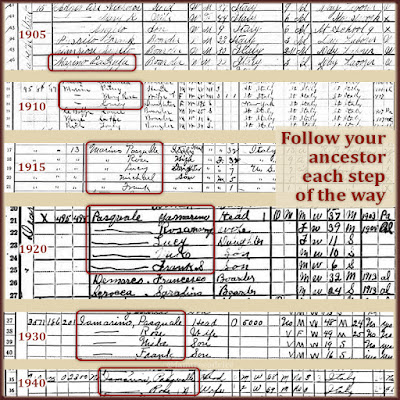It's the same way you get to Carnegie Hall. Practice, practice, practice.
Guess what happened after I spent hours and hours reading vital records from the 1800s. I became something of an expert on the subject.
A foreign language, squiggly handwriting, and countless abbreviations don't slow me down a bit. I'm used to it. And that made me practically a pro.
 |
| Sue me. It was the '80s. |
How to Make Yourself a Pro
Do you fall into one of these 3 camps?
- You climb one branch of your tree, adding people and facts from whichever document you just found.
- You don't move on until you've searched for every document for a particular family.
- You enjoy going off on tangents and plan to return later for the documents.
All those methods are fun. But you can become an expert on any one type of genealogy document if you make this one change.
Choose a single document type. It could be any one of these:
- census sheet
- ship manifest
- draft registration card
- birth record
- death record
- marriage record
- or some other type of document.
Commit a good chunk of time to searching for only this type of document. I'm in the midst of searching for every census sheet I don't yet have.
You'll need some way of seeing who in your family tree is missing their census sheet and for which year. I've got my Document Tracker and its "Need to find" column. I can go down the alphabetical list of names and search for every missing census. I'm up to last names beginning with L, and I'd like to knock off another letter or two this weekend.
You may not have a separate tracking sheet. But maybe your document image filing system can help you figure out what you have and what you're missing. The free program Family Tree Analyzer can help you keep tabs on your census sheet finds.
If all else fails, start with your parents and fan out. Go generation by generation, looking for missing censuses.
What to Learn
As you repeat your searches for this one type of document over and over, you will be learning. Here's the type of thing to keep in mind:
- Which search tricks are giving you a lot of success?
- Searching for a group of first names but no last name?
- Using Stephen Morse's tools to find the right set of census pages and going through them one at a time?
- Narrowing your search to a county rather than a town?
As you try out different ways of searching, they'll become second nature. You'll waste less time.
- What facts are you seeing on the documents that you've overlooked before?
- The native language on the 1920 census?
- The place of residence in 1935 on the 1940 census?
Here's a cheat sheet to show you what new questions the government asked in each U.S. Federal census.
- What conclusions can you draw by comparing documents?
- Can you tell that a certain relative died between the date of this census and the date of that census?
- Did the family move right before one of the children was born?
- Was one of the censuses wrong about the year of immigration or naturalization? Which one?
 |
| Follow your ancestors through each census to track family changes. |
After you spend enough time with one type of document, you will be an expert on that type of document.
Where do you want to start? The moment you begin downloading those new files, take a moment to add valuable facts to the image file. In whatever way makes you comfortable, keep track of what you've found and what you need.
Go on now, expert.
This is a great post, DiAnn. In the past I've searched for, let's say, all census records for a particular family line, but never for every single ancestor. I can see how looking at many varieties of the same type of record created through decades could help a researcher become an expert. Thanks for the suggestion.
ReplyDeleteI used a variation on this when I came across a county in my research where it didn't seem that my family was very deeply embedded but other names kept coming up over and over. So I started building a tree for the county using all the census records and then branching out to the marriage records and other things. I started understanding the relationships and the interconnectedness of all the people and I am getting to be an expert on that county much like you are familiar with those Italian towns you have been looking at. That's why I like online tree programs like Rootsfinder (my more recent trees) and Ancestry where I can build using that data very easily.
ReplyDeleteI've been spending today looking at one of my grandfather's towns. I'm working to place everyone with a particular last name in my tree, and of course their spouses.
Delete